Tree Trek
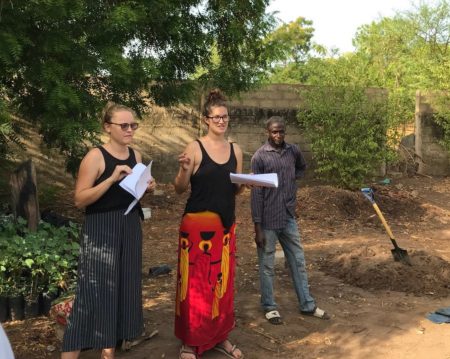
Agriculture PCVs Helena Oldenbourg and Corey Bruecker facilitated the North Bank 2019 Tree Trek, and visited schools and communities to talk about the importance of trees. They came to my school in Farafenni last week, and my counterpart Jatta assisted them with their presentation to the 7th grade students. The session was held in the school garden, where the compost the students made earlier in the year, was now ready to use for planting trees.
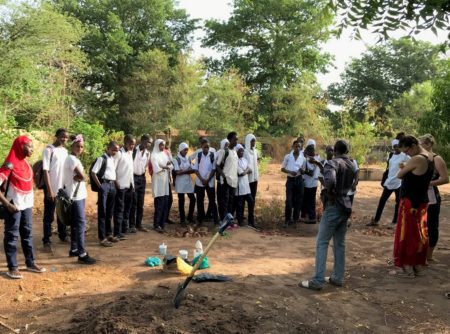
Helena and Corey engaged the students in a discussion about different types of trees, their common uses, and how they benefit the environment. I have been working with these students all year, and I was impressed by how well they had learned their lessons. When they were asked to list how trees are used in their everyday activities, they responded by stating: they provide food for people and livestock, fuel to cook their meals, wood for building homes, shops and fences, they can provide shade to cool their environment, and can be planted in rows to create windbreaks. Other benefits include: erosion control during the seasonal rains and dust storms, pollen for the bees, and homes for birds, bats and wildlife. Additionally, some trees can use atmospheric nitrogen and add it to the soil to increase fertility, and all trees use the process of photosynthesis to take in carbon dioxide and release oxygen.
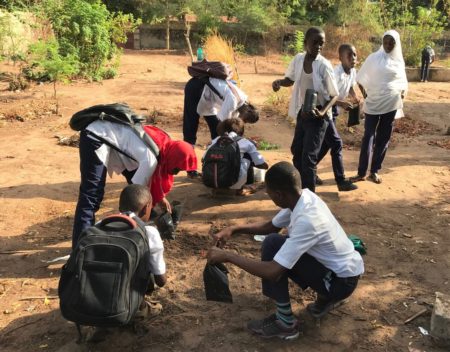
There were four types of tree seeds available to be planted into polypots for the tree trek program: lime, mango, cashew, and moringa. Most of the students had previous experience starting trees, so they knew how to fill the polypots and tamp down the soil to reduce air pockets, prior to inserting the seed into the soil. Corey and Helena demonstrated how each seed variety needs to be planted so the roots will grow correctly.
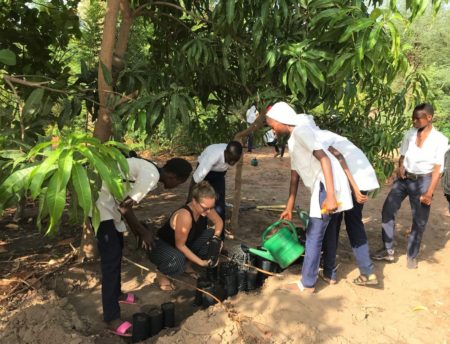
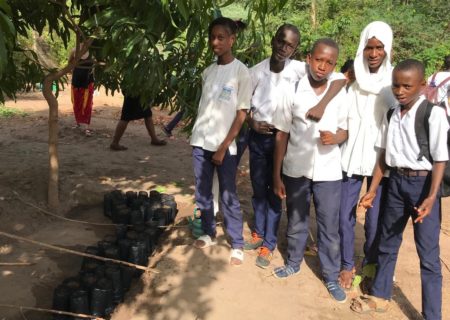
The students planted a total of 70 polypots, which were placed in a trench under the shade of a mango tree, separated by sticks for each tree variety. There are advantages to placing polypots in a trench: they can be stabilized by packing dirt around each polypot, and the soil will retain moisture better while the seeds are germinating. It is important to locate the newly planted polypots in the shade to protect them from the harsh sunlight and blowing winds, until they are well established and ready to be outplanted.
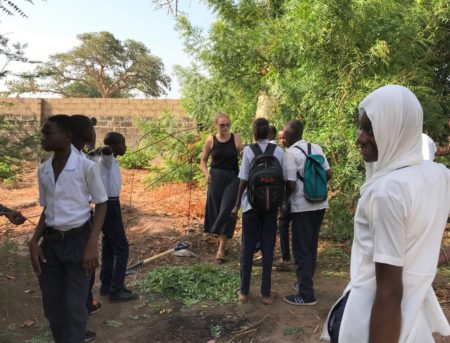
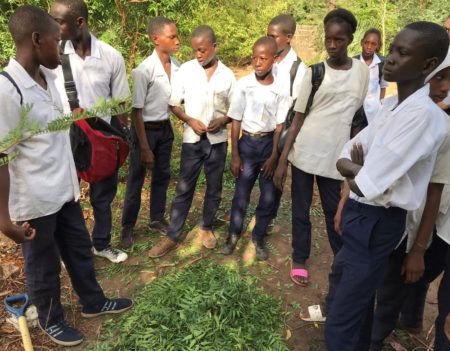
The final lesson of the day was to outplant lime trees that had been growing in polypots for a couple of years. We gathered moringa leaves to mix into the soil prior to placing the lime trees in the planting holes, because moringa has insecticidal effects, and are particularly effective in controlling ants and termites. Moringa also has a high nutritional value, and is commonly used to make sauces for rice dishes, by pounding the leaves and adding spices. Moringa is one of the most nutrient-dense plants on the planet, and has been labeled a “superfood” – “miracle tree” – “tree of life” and has been used by Gambians for generations.
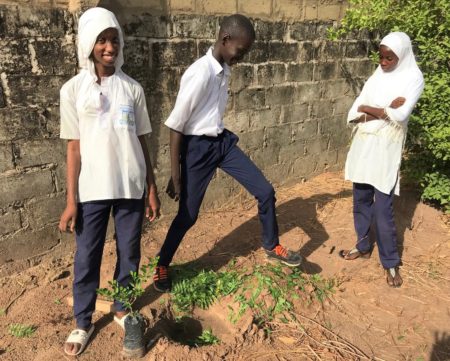
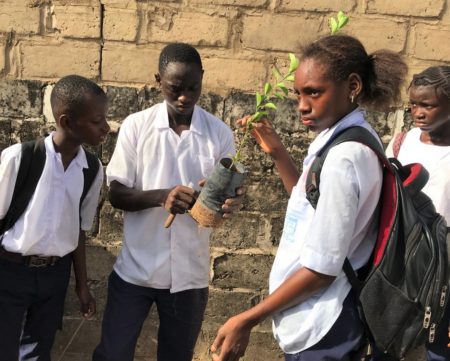
Twelve planting holes had been dug by my counterpart Jatta, in preparation for the Tree Trek program. We had our first rain storm of the season the previous night, so the day was perfect for outplanting lime trees. The students mixed moringa leaves into the planting hole soil, and removed the bottom of the polypots to expose the lime roots, before placing the baby tree into the holes. Careful handling of the young trees was emphasized to insure that the trees get off to a healthy start.
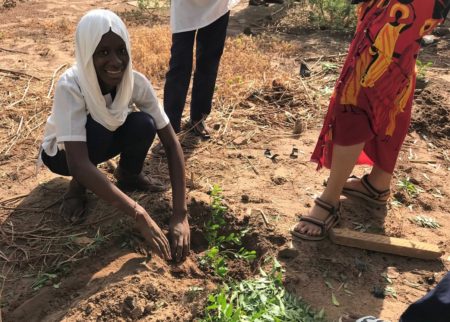
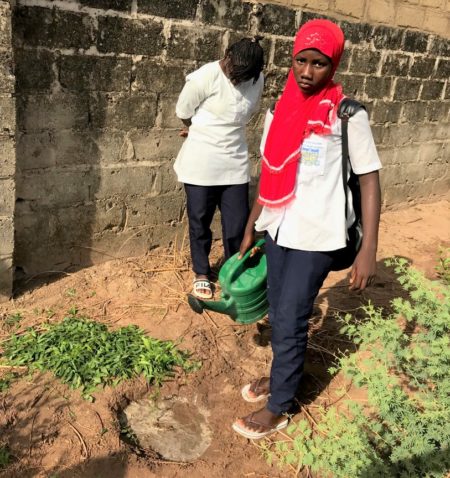
Tree Trek was definitely a highlight for the 7th grade students that had worked hard all year to learn agriculture skills. In the fall they began their school year preparing vegetable beds, after learning how to make biochar, compost, and preparing the soil with the permagarden method. The conscientious students were able to harvest food for their families meals, and the students that didn’t water their vegetable beds regularly hopefully learned some lessons about what happens when you don’t. I am a firm believer that failure can be a great teacher, if you choose to pay attention to the lessons presented.
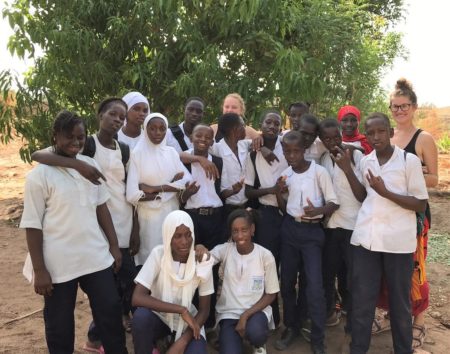
I am grateful to Corey and Helena for coming to my school with this program that reinforced the lessons I have been teaching this year. The Gambia has become severely deforested during the last fifty years, due to illegal harvesting of timber and overuse of trees to make charcoal for cooking. It is my hope that by teaching the youth the importance of trees for the health of their country and the world, they can help address climate change by planting trees.
One thought on “Tree Trek”
Hi Susan,
I know you went to The Gambia with a lot of knowledge about agriculture and botany, but it also sounds like you have learned a few new things yourself. What an experience!
Comments are closed.